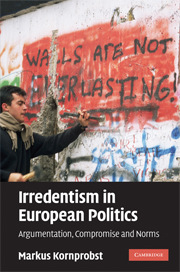Book contents
- Frontmatter
- Contents
- List of figures
- List of maps and tables
- Acknowledgements
- List of abbreviations
- Introduction
- 1 Irredentism in Europe
- 2 Argumentation and compromise
- 3 Broadening a vision for Europe
- 4 Towards a new beginning
- 5 From exclusion to inclusion
- 6 Constitutional change
- Conclusion
- Appendix I Coding procedures
- Appendix II Irredentist cases in Europe and other world regions
- Appendix III Analysed parliamentary debates and newspaper editions
- Bibliography
- Index
5 - From exclusion to inclusion
Published online by Cambridge University Press: 21 August 2009
- Frontmatter
- Contents
- List of figures
- List of maps and tables
- Acknowledgements
- List of abbreviations
- Introduction
- 1 Irredentism in Europe
- 2 Argumentation and compromise
- 3 Broadening a vision for Europe
- 4 Towards a new beginning
- 5 From exclusion to inclusion
- 6 Constitutional change
- Conclusion
- Appendix I Coding procedures
- Appendix II Irredentist cases in Europe and other world regions
- Appendix III Analysed parliamentary debates and newspaper editions
- Bibliography
- Index
Summary
The Republic of Ireland found it even more difficult than the FRG to come to terms with the territorial status quo. Rejecting the partition of Ireland resulting from the 1921 Anglo-Irish Treaty, the Irish Free State and later the Republic of Ireland steadfastly refused to withdraw its de jure claim to Northern Ireland for almost eight decades. Being a cornerstone of the identity narrative in the Republic, the claim even featured prominently in the Constitution. In 1998, however, the Republic changed its Constitution and recognised the territorial status quo. How did this become possible?
The following two chapters seek to find a plausible answer to this question. Analogous to the third chapter, the purpose of this chapter is descriptive. It traces the evolution of the repertoire of commonplaces upon which actors in the Republic of Ireland drew to reason on the Irish Question. The chapter thereafter uses the findings of this chapter as a starting point for its examination of which topoi advocates of normative ideas about the territorial status quo picked from this repertoire of commonplaces and with what success.
How did the repertoire evolve? In a nutshell, the identity narrative, an important ingredient of the repertoire, exhibited a highly salient continuity throughout the analysed time period from 1921 to 1998. The Republic's longing for the unification of North and South persistently constituted a key aspect of the repertoire of commonplaces.
- Type
- Chapter
- Information
- Irredentism in European PoliticsArgumentation, Compromise and Norms, pp. 137 - 178Publisher: Cambridge University PressPrint publication year: 2008



